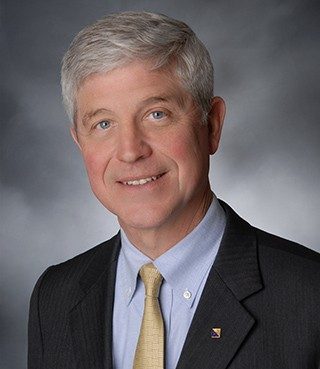Annual Report 2017
Executive Director's Message
A Year of Progress, with More to Come
We entered 2017 with great expectations for the American Chemical Society (ACS). Despite some significant and continuing challenges, these expectations were largely realized, and the year yielded a number of records for the Society.
This report touches on the most significant new activities from the past year; more details and additional accomplishments can be found in the “2017 Highlights of ACS Achievements.”
From a financial perspective, 2017 was a strong year, with total consolidated revenues of $569 million. For the first time in more than a decade, we achieved all five of our financial goals. The funded position of the Society’s defined-benefit retirement plan also improved in 2017. These positive results can be traced to good expense management, growth in our investment portfolio and record revenues from Chemical Abstracts Service (CAS) and ACS Publications products.

At CAS, the big story was the commercialization of major upgrades to STN® and SciFinder®, our products for searching the world's disclosed scientific and technical research.
In the publishing arena, ACS led the establishment of the chemical sciences preprint server ChemRxiv™. We also launched the journal ACS Earth and Space Chemistry.
Under the brand of Chemical & Engineering News, the official organ of ACS, we introduced C&EN BrandLab, which is designed to help advertisers create custom branded content. This program began reducing C&EN’s reliance on print ads as a source of revenue. In addition, C&EN Global Enterprise went live in 2017, expanding the reach of C&EN to the 2,500 institutions around the globe that subscribe to ACS’s all-publications package. C&EN also increased its Spanish content this past year and published Chinese versions of some of its stories on ACS’s WeChat platform.
ACS is expanding its content and programming for international members in other ways. In South Korea, we hosted the first ever meeting of our chapters in the Asia-Pacific region. And with partner societies from four continents, we continued preparations for the first Atlantic Basin Conference on Chemistry (ABCChem), subsequently held in January 2018 in Cancún, Mexico.
For our own national meeting, we set an all-time record for turnout, with nearly 19,000 attendees making their way to San Francisco in the spring of 2017. Meanwhile, the ACS-sponsored team of high school chemistry students representing the U.S. at the International Chemistry Olympiad in Thailand set a record of its own. For the first time in the program’s history, the U.S. team won four gold medals.
We continued to make progress with our advocacy and policy work in Washington, D.C. With ACS backing, the Senate Chemistry Caucus was launched and grew to 14 members by year-end, while the House Chemistry Caucus grew to 63 members. We successfully supported three bills covering STEM-related subjects. Late in the year, ACS, among many others, championed the renewal of continued tax exemptions for graduate student tuition waivers.
Looking inward, we examined our own governance with the aim of streamlining and simplifying our structure and processes. We eliminated a committee on grants and awards, and shifted its responsibilities to the Committee on Professional and Member Relations. We converted the governing board for the ACS Green Chemistry Institute® into a smaller and more nimble advisory board. And we laid the groundwork to simplify ACS’s committee structure as well as its Constitution and Bylaws in 2018.
After adding safety and ethics to ACS’s Core Values in late 2016, our staff and volunteers worked to emphasize safety and ethics in everything we did. For example, ACS established a centralized web presence for chemical safety and created our first full-time staff position dedicated to the subject. We hosted three ethics workshops in Kenya, Morocco and Australia. Attendees then conducted their own workshops for colleagues after returning home.
Security was also an important focus. We hired our first chief information security officer and took other important steps to enhance our cyber security. We launched new programs to make the ACS and CAS buildings more secure.
ACS implemented a new enterprise-wide system to standardize financial accounting and reporting processes across the Society. This step is part of our continued campaign to break down the silos that separate ACS’s processes and departments. We also reorganized three of our internal divisions to promote collaboration and to better align our structure with member needs. We'll get more done, faster, if we work together.
Despite these many positive achievements in 2017, we didn't accomplish everything we wanted to. For instance, ACS membership growth has been elusive. The number of industrial members dropped below half of our overall membership.
To turn this around, we have to focus even more on the needs of current and prospective members. We need to continue to connect with newcomers to our field, so we can convert student members to full members. We need to reconnect with our industrial members. We have to look at our publications to see if they are still relevant and interesting for those members. And we need to do more to attract international members, because the practice of chemistry is global. We are exploring numerous ways to enhance our value for members.
In closing, I would like to thank the ACS member volunteers. Over the past year, they were active in the local sections. They ensured the success of the 30th National Chemistry Week as well as Chemists Celebrate Earth Day, which coincided with the March for Science. Volunteers in the technical divisions pulled together programs for ACS meetings.
These are just a few examples of why I am continually struck by the passion of our member volunteers. I salute them for going above and beyond, on a daily basis, in support of the ACS Vision of improving people’s lives through the transforming power of chemistry.
